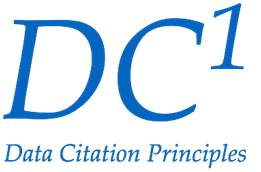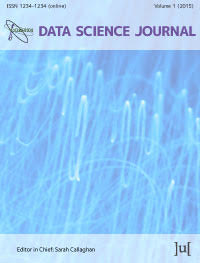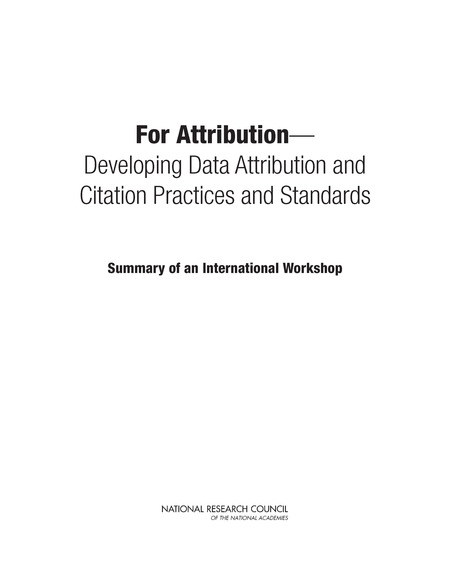Data Citation Standards and Practices – Past Achievements
Achievements 2014-16
The main objective of the Task Group for 2015-2016 was to promote the implementation of the data citation principles in the research policy and funding communities throughout the world. The Task Group held a major series of national and regional workshops dedicated to this focused objective and has prepared a synthesis paper that integrates the findings.
Five such workshops were held in 2015:
- China, Lanzhou, 25 August 2015
- Australia, Australian Academy of Science, Canberra, 28 October 2015
- Japan, National Institute of Informatics, Tokyo, 29 October 2015
- India, Indian National Science Academy, New Delhi, 4-5 November 2015
- South Africa, Council for Scientific and Industrial Research (CSIR), Pretoria, 10 December 2015
A further five workshops were held in 2016:
- Israel, Tel Aviv, 25 May 2016
- USA, National Academies of Sciences, Engineering & Medicine, Washington, 12 July 2016
- Finland, Finnish National Open Science and Research Initiative ATT, Helsinki, 23 November 2016
- Taiwan, National Taiwan University Library, 5 December 2016.
Achievements 2014

Joint Declaration of Data Citation Principles
CODATA and the Task Group on Data Citation Standards and Practices contributed instrumentally to the development of the Joint Declaration of Data Citation Principles.
Preamble: Sound, reproducible scholarship rests upon a foundation of robust, accessible data. For this to be so in practice as well as theory, data must be accorded due importance in the practice of scholarship and in the enduring scholarly record. In other words, data should be considered legitimate, citable products of research. Data citation, like the citation of other evidence and sources, is good research practice and is part of the scholarly ecosystem supporting data reuse.
In support of this assertion, and to encourage good practice, we offer a set of guiding principles for data within scholarly literature, another dataset, or any other research object.
For more information on the development of these principles, see the blog post Data Citation Synthesis Group: Draft Declaration of Data Citation Principles.
Achievements 2013
 Report published in the Data Science Journal.
Report published in the Data Science Journal.
Abstract: The growth in the capacity of the research community to collect and distribute data presents huge opportunities. It is already transforming old methods of scientific research and permitting the creation of new ones. However, the exploitation of these opportunities depends upon more than computing power, storage, and network connectivity. Among the promises of our growing universe of online digital data are the ability to integrate data into new forms of scholarly publishing to allow peer-examination and review of conclusions or analysis of experimental and observational data and the ability for subsequent researchers to make new analyses of the same data, including their combination with other data sets and uses that may have been unanticipated by the original producer or collector.
Citation: Sices, C.-I. T. G. on D. C. S. and P. of C. O. of M. T. C.. (2013). Out of Cite, Out of Mind: The Current State of Practice, Policy, and Technology for the Citation of Data. Data Science Journal, 12(0), CIDCR1–CIDCR7. DOI: http://doi.org/10.2481/dsj.OSOM13-043
Achievements 2012
 For Attribution: Developing Data Attribution and Citation Practices and Standards
For Attribution: Developing Data Attribution and Citation Practices and Standards
Summary of an International Workshop, published by National Academies Press.
This report summarises an international workshop that was organised in collaboration with the US National CODATA Committee and the Board on Research Data and Information, in August 2011.
Abstract: The growth of electronic publishing of literature has created new challenges, such as the need for mechanisms for citing online references in ways that can assure discoverability and retrieval for many years into the future. The growth in online datasets presents related, yet more complex challenges. It depends upon the ability to reliably identify, locate, access, interpret, and verify the version, integrity, and provenance of digital datasets. Data citation standards and good practices can form the basis for increased incentives, recognition, and rewards for scientific data activities that in many cases are currently lacking in many fields of research. The rapidly-expanding universe of online digital data holds the promise of allowing peer-examination and review of conclusions or analysis based on experimental or observational data, the integration of data into new forms of scholarly publishing, and the ability for subsequent users to make new and unforeseen uses and analyses of the same data-either in isolation, or in combination with, other datasets.
The problem of citing online data is complicated by the lack of established practices for referring to portions or subsets of data. There are a number of initiatives in different organizations, countries, and disciplines already underway. An important set of technical and policy approaches have already been launched by the U.S. National Information Standards Organization (NISO) and other standards bodies regarding persistent identifiers and online linking.

The workshop summarized in For Attribution — Developing Data Attribution and Citation Practices and Standards: Summary of an International Workshop was organized by a steering committee under the National Research Council’s (NRC’s) Board on Research Data and Information, in collaboration with an international CODATA-ICSTI Task Group on Data Citation Standards and Practices. The purpose of the symposium was to examine a number of key issues related to data identification, attribution, citation, and linking to help coordinate activities in this area internationally, and to promote common practices and standards in the scientific community.
